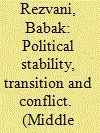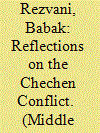| Srl | Item |
| 1 |
ID:
165744


|
|
|
|
|
| Summary/Abstract |
Tajikistan and Georgia, in Central Asia and the South Caucasus respectively, are both small Soviet successor states with a recent history of political volatility and instability until the mid-2000s. Nevertheless, these independent countries have eventually developed diverging policies, notably with regard to their political alliances and world orientations. The Tajikistani Civil War resembles in many ways that of the Chechen conflict and also helps us understand the Syrian conflict. Similar to Georgia, Tajikistan had experienced the collapse of state institutions more intensely than other Soviet republics. Although contingent and actor-driven factors may have influenced the outcome, the influence of structural factors has been far greater than those agency-driven factors. This review article discusses, and tries to offer understanding and explanations for, political stability, transition and conflict in these two countries.
|
|
|
|
|
|
|
|
|
|
|
|
|
|
|
|
| 2 |
ID:
134505


|
|
|
|
|
| Summary/Abstract |
The Chechen Conflict is the most fatal and protracted conflict in the post-Soviet space. While it is the most discussed conflict there, it is also the least understood. Many contradicting accounts of it exist, and still many questions remain unanswered. One reason is that the nature of this conflict has changed over time. Unlike what many - particularly Western - analysts think, it is not a religious conflict. It began as an ethno-nationalist separatist conflict but only later was it infiltrated by extremist Salafis/Wahhabis. At this moment a war is going on between the local Chechen and the central Russian governments against the Salafi/Wahhabi Emirate of the Caucasus. Chechnya is the only autonomous region in Russia in which a separatist movement had been successful. The possible reasons are the peculiarities of the Caucasus; especially its mosaic type of ethnogeographic configuration and the traumatic past of many of its peoples. Another important factor in the explanation of such a separatist conflict in Chechnya - and nowhere else in the North Caucasus - is the fact that only in Chechnya has a titular minority enjoyed a dominant demographic position. This paper also discusses issues such as the nature of Islam in Chechnya and the Russian geopolitical codes.
|
|
|
|
|
|
|
|
|
|
|
|
|
|
|
|
| 3 |
ID:
177271


|
|
|
|
|
| Summary/Abstract |
This article reviews and discusses the Russian foreign policy towards several countries in the Post-Soviet Space (Tajikistan, Ukraine and Georgia), and the Middle East (Syria). The Russian policy towards its near abroad shows elements of both (neo-)realism and constructivism. A realist perspective of Russian foreign policy seems evident as Russia pursues its own national (or imperial) geopolitical interest. However, it may not explain the Russian interventions satisfactorily. Analysing Russia’s intervention in these conflicts, it is important to look also at Russia’s own geopolitical vision; i.e. how Russia views the world, notably its near abroad, and Russia’s place, role or even mission in it. Russia has reacted to the NATO and European Union (EU) enlargements in its (former) geopolitical spheres of influence and has helped its ally Bashar Assad remain in power in Syria. The conflict in Ukraine is not irrelevant to that in Syria and the Russian experience in Chechnya and Tajikistan may have codetermined Russian intervention in Syria.
|
|
|
|
|
|
|
|
|
|
|
|
|
|
|
|